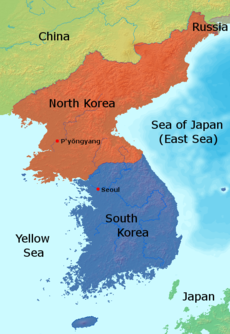
The member states of the United Nations comprise 193 sovereign states. The United Nations (UN) is the world's largest intergovernmental organization. All members have equal representation in the UN General Assembly.
A United Nations General Assembly resolution is a decision or declaration voted on by all member states of the United Nations in the General Assembly.

United Nations Command is the multinational military force established to support the Republic of Korea during and after the Korean War. It was the first international unified command in history, and the first attempt at collective security pursuant to the Charter of the United Nations.

Resolution 82 was adopted by the United Nations Security Council (UNSC) on 25 June 1950. It condemned the "armed attack on the Republic of Korea by forces from North Korea", while calling for "the immediate cessation of hostilities" and for "the authorities in North Korea to withdraw forthwith their armed forces to the 38th parallel". The measure was adopted with 9 voting for, none opposed, and one abstention by Yugoslavia. The Soviet Union was absent, as it was boycotting the UN at the time for its recognition of the Republic of China as China's representative to the organization.

United Nations Security Council resolution 652, adopted unanimously on 17 April 1990, after examining the application of the Republic of Namibia for membership in the United Nations, the Council recommended to the General Assembly that Namibia be admitted.

United Nations Security Council resolution 704, adopted without a vote on 9 August 1991, after examining the application of the Marshall Islands for membership in the United Nations, the Council recommended to the General Assembly that the Marshall Islands be admitted.

United Nations Security Council resolution 709, adopted without a vote on 12 September 1991, after examining the application of the Republic of Estonia for membership in the United Nations, the Council recommended to the General Assembly that Estonia be admitted.
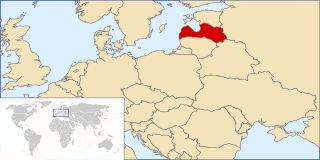
United Nations Security Council resolution 710, adopted without a vote on 12 September 1991, after examining the application of the Republic of Latvia for membership in the United Nations, the Council recommended to the General Assembly that Latvia be admitted.

United Nations Security Council resolution 711, adopted without a vote on 12 September 1991, after examining the application of the Republic of Lithuania for membership in the United Nations, the Council recommended to the General Assembly that Lithuania be admitted.
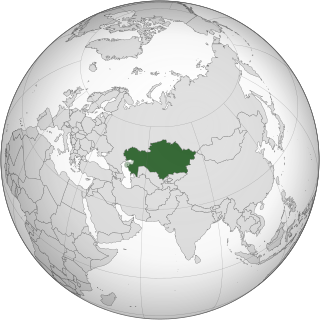
United Nations Security Council resolution 732, adopted without a vote on 23 January 1992, after examining the application of the Republic of Kazakhstan for membership in the United Nations, the Council recommended to the General Assembly that Kazakhstan be admitted.

United Nations Security Council resolution 738, adopted without a vote on 29 January 1992, after examining the application of the Republic of Tajikistan for membership in the United Nations, the Council recommended to the General Assembly that Tajikistan be admitted.
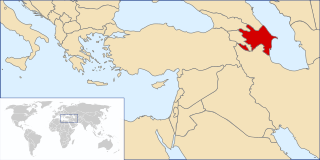
United Nations Security Council resolution 742, adopted without a vote on 14 February 1992, after examining the application of the Azerbaijani Republic for membership in the United Nations, the Council recommended to the General Assembly that Azerbaijan be admitted.

United Nations Security Council resolution 753, adopted without a vote on 18 May 1992, after examining the application of the Republic of Croatia for membership in the United Nations, the Council recommended to the General Assembly that Croatia be admitted. The recommendation came amid the breakup of Yugoslavia.

United Nations Security Council resolution 754, adopted without a vote on 18 May 1992, after examining the application of the Republic of Slovenia for membership in the United Nations, the Council recommended to the General Assembly that Slovenia be admitted. The recommendation came amid the breakup of Yugoslavia.

United Nations Security Council resolution 755, adopted without a vote on 20 May 1992, after examining the application of the Republic of Bosnia and Herzegovina for membership in the United Nations, the Council recommended to the General Assembly that Bosnia and Herzegovina be admitted. The recommendation came amid the breakup of Yugoslavia.
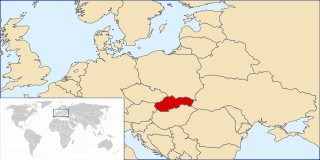
United Nations Security Council resolution 800, adopted without a vote on 8 January 1993, after examining the application of the Slovak Republic for membership in the United Nations, the Council recommended to the General Assembly that Slovakia be admitted.

The 2012 United Nations Security Council election was held on 18 October 2012 during the 67th session of the United Nations General Assembly, held at the Headquarters of the United Nations in New York City. The elections were for five non-permanent seats on the UN Security Council for two-year mandates commencing on 1 January 2013 to replace the five countries whose terms expired. The countries elected were Argentina, Australia, Luxembourg, the Republic of Korea, and Rwanda with Luxembourg being elected for the first time.

The Republic of Korea and the Democratic People's Republic of Korea were simultaneously admitted to the United Nations (UN) in 1991. On 8 August 1991, the UN Security Council passed Resolution 702, recommending both states to the General Assembly for membership. On 17 September 1991, the General Assembly admitted both countries under Resolution 46/1.
